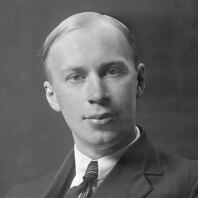Sergei Prokofiev
Composer
Sergei Prokofiev, whose extensive catalogue of works includes operas, ballets, symphonies and solo concertos, described five basic lines of his own composing in his autobiography: classical structure, modern harmonies, motoric rhythm, lyricism, and humour. These main lines do not correspond to different phases of his life; rather, the changing between different styles, which affected all forms and genres, was an essential feature of Prokofiev’s entire oeuvre.
Sergei Prokofiev, born in 1891, studied composition and piano as a teenager at the conservatory in St Petersburg under Nikolai Rimsky-Korsakov, Anatoly Lyadov and Alexander Cherepnin, among others. After the scandalous premiere of his highly virtuoso 2nd Piano Concerto in 1913 in Pavlovsk, he was acclaimed by the avant-garde, while conservative circles saw in him the “enfant terrible” of Russian music. Prokofiev left Russia after the October Revolution. In the USA, where he lived from September 1918 to February 1922, he established his global career as a composer and virtuoso. After a short time in Ettal in Bavaria, Prokofiev then went to Paris in 1923. Around ten years later, he began to commute between France and the USSR before returning home permanently: voluntarily and without material need, due to “homesickness for Russia”, as his son Svyatoslav later explained. The war years were a time of the highest recognition for Prokofiev: orders, several Stalin prizes and numerous premieres consolidated his standing as a worthy Soviet artist. However, in February 1948, he, like many Soviet artist colleagues, was then accused of “harmful formalist and cosmopolitan tendencies” – mainly because his works were performed in the West at the time of the emerging Cold War. By then, Prokofiev was already living in seclusion in his country house in Nikolina Gora near Moscow. He died on 5 March 1953, the same day as Josef Stalin.